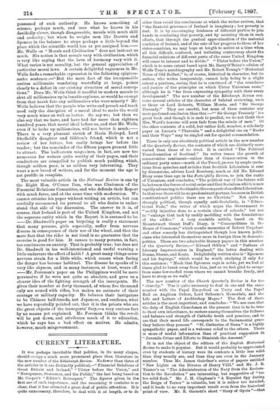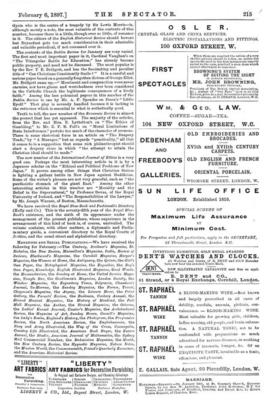CURRENT LITERATURE.
It was perhaps inevitable that politics, in its many shapes, should occupy a much more prominent place than literature in the new number of the Edinburgh Review. No fewer than three of the articles in it are distinctly political,—" Financial Relations of Great Britain and Ireland," " Ulster before the Union," and "Newspapers, Statesmen, and the Public," the last being based on Mr. Cooper's "Editor's Retrospect." The figures given in the first are of such importance, and the reasoning it contains is so clear, that it has attracted a great deal of public attention. It is quite unnecessary, therefore, to deal with it at length, or to do other than recall the conclusions at which the writer arrives, that "the financial grievance of Ireland is imaginary ; her poverty is real. It is by encouraging Irishmen of different parties to join hands in combating that poverty, and by assisting them in such efforts, that through the gradual approximation of the material condition of Ireland, and of the rate of her progress to those of her sister-countries, we may hope at length to arrive at a time when all this difficult, confused, and irritating controversy about the financial relations of different parts of the same United Kingdom will cease to interest and to divide." " Ulster before the Union," which is to some extent based upon Mr. Barry O'Brien's edition of Wolfe Tone's autobiography and Mr. Robert Young's " Historical Notes of Old Belfast," is, of course, historical in character, but its author, who writes temperately, cannot help being to a slight extent a partisan, seeing that he is convinced of "the soundness and justice of the principles on which Ulster Unionism rests," although he is "far from expressing sympathy with their every development." The new number of the Edinburgh Review con • tains several articles of the character of belated reviewing, such as those on Lord Roberts, William Morris, and " Sir George Tressady." They are careful, but none of them contains any more profound conclusion than this :—" Sir George Tressady' is a great book :and though it is rash to predict, we do not think that Mrs. Ward's heroine will soon fade from the minds of men." Of the other contents of a solid, but rather dull, number, a scholarly paper on Lucan's " Pharsalia " and a delightful one on " Rooks and their Ways" may be singled out for special commendation.
There is only one absolutely political article in the new number of the Quarterly Review, the contents of which are distinctly more varied than those of its rival. It is entitled " The Political Transformation of Scotland." Its writer traces the growth of conservative sentiment—rather than of Conservatism in the ordinary party sense—north of the Tweed, proves by ample quota- tions from speeches and articles that Scottish Liberalism is rent by dissensions, advises Lord Rosebery, much as did Mr. Edward Dicey some time ego in the Fortnightly Review, to join the ranks of Unionism, and concludes, " The political war of the future will be between the forces of social order and that Socialism which is now rapidly advancing in Scotland to the conquest of an effete Liberalism. In that war there will be no predominant partner, because in British constitutional politics there are no Cheviots." Not quite so strongly political, though equally anti-Socialistic, is " Educa- tional Fads," the writer of which urges the Government to "rectify injustice done to a certain class of schools," but not to " enlarge that task by rashly meddling with the foundations of the edifice." A very readable article, based on Sir Mountstuart Grant Duff's Diary, is "Cosmopolitans in the House of Commons," which recalls memories of Robert Urquhart and other scarcely less distinguished though less known politi- cians who interested themselves more in foreign than in domestic politics. There are two admirable literary papers in this number of the Quarterly Review,—" Edward Gibbon" and " Fathers of Literary Impressionism in England," the latter dealing with Donne, Sterne, and Keats. Delightfully written also is "Epicurus and his Sayings," which would be worth studying if only for this sentence : "Much that Epicurus says is noble, yet we feel at times glad to break away from him, just as we feel glad to escape from some low-roofed room where we cannot breathe freely, and have to stoop as we walk."
The new number of the Church Quarterly Review is far too " churchy." Was it quite necessary to deal in one and the same number with the Papal Encyclical on Unity and the Papal Bull on Anglican Orders, Lord Selborne's Memorials, and the Life and Letters of Archbishop Magee ? The first of these articles is the most important, and concludes : " We are sure that the duty of English Churchmen at the present time is to be true to their own inheritance, to restore among themselves the fullness and balance and strength of Catholic truth and practice, and to see that their moral life corresponds to the Sacramental grace they believe they possess." " St. Catharine of Siena" is a highly sympathetic paper, and is a welcome relief to the others. There is more of useful information than of practical suggestion in " Juvenile Crime and Efforts to Diminish the Amount" It is not the object of the editors of the English Historical Review to make it popular. But it would probably be appreciated even by students of history were its contents a little less solid than they usually are, and than they are even in the January number. Thus Mr. James Gairdner's series of papers entitled "New Lights on the Divorce of Henry VIIL" and Mr. J. R. Tanner's on " The Administration of the Navy from the Restora- tion to the Revolution" are interesting, but suggestive of "too too solid flesh." Mr. J. H. Clapham's "A Royalist Spy during the Reign of Terror" is valuable, but it is rather too detailed, and it leads to no very important result even from the historical point of view. Mr. R. Garnett's short " Story of Gycia "—that Clyde who is the centre of a tragedy by Sir Lewis Morris—is, although merely a note, the most valuable of the contents of this number, because there is a little, though ever so little, of romance in it. The editors of the English Historical Review should beware lest Dryasdust gets too much consideration in their admirable and valuable periodical, if not command over it.
The contents of the .Dublin Review for January are very varied. The first and most important paper in it, Cardinal Vaughan's on "The Triangular Battle for Education," has already become public property, and need not be discussed. The most popular is by the Rev. T. E. Bridgett, and has the fascinating and peculiar title of " Can Christians Consistently Smile ? " It is a careful and serious paper based on a generally forgotten dictum of George Eliot. Mr. Bridgett sums un,—" Merriment and compunction were never enemies, nor have gloom and wretchedness ever been considered in the Catholic Church the legitimate consequences of a lively faith." Among the less polemical papers in this number of the Dublin Review is one by Mr. A. F. Spender on Ibsen's " Little Eyolf." That play is severely handled because it is lacking in the reticence which is essential to what is aesthetically good.
Truth to tell, the new number of the Economic Review is almost the poorest that has yet appeared. The majority of the articles, from the Rev. and Hon. E. Lyttelton's on " The Ethics of Gambling," to Mr. E. F. B. Fell's on " Moral Limitations of State Interference," partake too much of the character of sermons. There is some rhetorical force in an article on " The Drapery Trade," by " A Manager," but as regards "practicality," all that it comes to is a suggestion that some rich philanthropist should start a drapery store in which "the attempt to attain the Christian ideal should be made."
The new number of the International Journal of Ethics is a very good one. Perhaps the most interesting article in it is by a Japanese scholar on the "Ethical and Political Problems of New Japan." It proves among other things that Christian theism is fighting a gallant battle in New Japan against Buddhism. Some of the writer's phrases are not very graceful, such as "the pantheistic stomach of the giant East." Among the other interesting articles in this number are " Morality and the Belief in the Supernatural," by Professor Devas, of the Royal University of Ireland, and "The Responsibilities of the Lawyer," by Mr. Joseph Warner, of Boston, Massachusetts.
We have received the Royal Blue-Book and Fashionable Directory (Kelly and Co.) This is the seventy-fifth year of the Boyal Blue- Book's existence, and the sixth of its appearance under the management of the present publishers, whose experience in the arrangement of this kind of book is, of course, unrivalled. The volume contains, with other matters, a diplomatic and Parlia- msntary guide, a convenient directory to the Royal Courts of Justice, and the usual street and alphabetical directory.







































 Previous page
Previous page